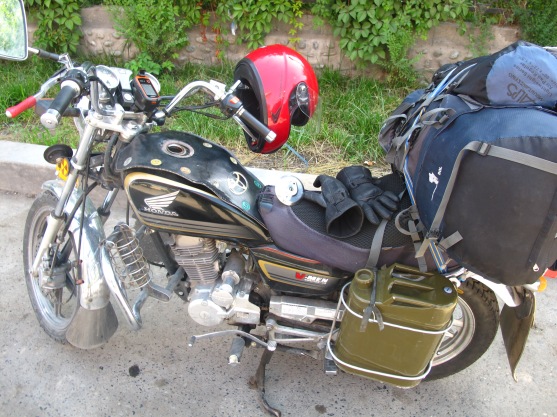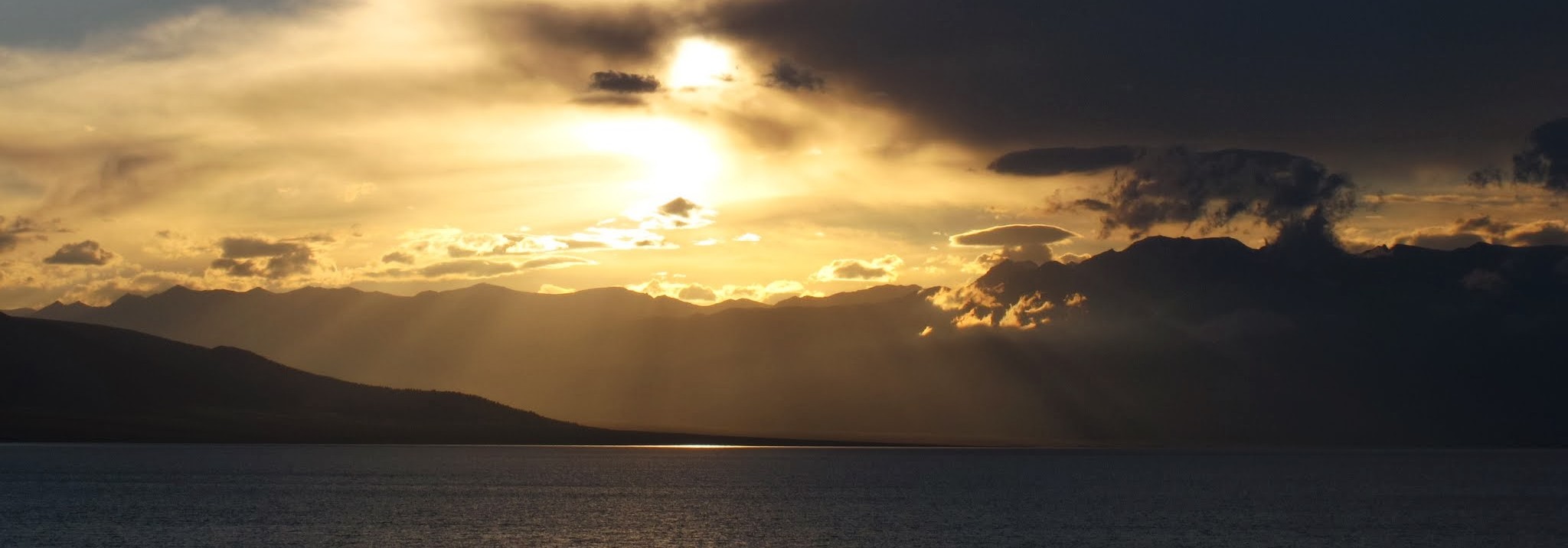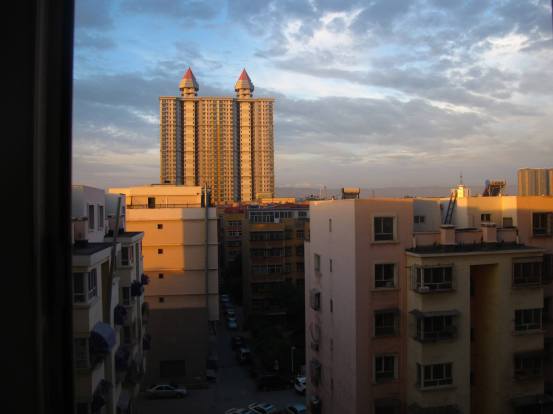By July 4th I was ready to set out. I had a plan: drive along the Chinese highway north into the dusty scrub of the Zhunggar Basin to the border crossing at Takeshiken–the western land crossing into Mongolia that had opened up to foreigners in 2011. From there I would head along the local roads for several days until I hit the Northern Route, one of three main arteries linking the far western fringe of the country to the capital Ulaanbaatar. Once I was on this road I imagined it would be plain sailing heading east, gradually approaching denser settlements.
My bike, a 250 cc Honda cruiser, had recently had an entire engine overhaul, along with a frame welded to the panniers to carry a jerry can of extra fuel, which would be critical in the areas of Mongolia where fuel stations are commonly 300 miles apart or more. At Lao Deng’s suggestion, I had swapped out my tires for a tubeless variety, to minimize the chances of puncture. For gear I carried the following: a basic set of tools, tent, sleeping bag, small camping stove, rain gear, and a couple spare changes of clothes. For food I had a sizable cache of Ekströms instant blueberry soup, courtesy of a recent visit from my Swedish uncle Olle, perfect for some vitamin C and quick energy when fresh fruit would be scarce. Over the trip I bought bread where available and lots of canned sardines, and ate simple but filling meals.
With help from the outstanding resources http://www.openstreetmap.org and especially http://www.openmtbmap.org I had also gathered detailed contour maps of the entire country of Mongolia. It is amazing that with a few quick downloads to a portable gps device I held in my hand the ability to navigate to the very limits of civilization, thanks to the wonder of the internet and freely available satellite data. Not too long ago I would have been completely reliant on hard-to-obtain Soviet topographical maps to find my way. Still, I carried a basic roadmap + compass to be safe.
I had also finally obtained my Chinese motorcycle license, which had required a long gauntlet of choreographed red stamping that seems to define Chinese bureaucratic dealings. After working up to a red stamp of sufficient size and prestige I was allowed to take the two written license exams in Mandarin, barely scoring the necessary 92% on the second one to pass. Yet all the pain and effort had been worth it when I was able to walk to my local police station and talk to the smartly uniformed receptionist (who by now knew me well), to receive a shiny greenish card replete with concerned-looking head shot and my name in Chinese characters printed beside it. All this to make sure I would be able to pass the highway police checkpoints, found increasingly frequently with the rising tide of ethnic violence in the region.
Shihezi’s tallest building at dawn, as viewed from my apartment, glaciers of the Tian Shan can be seen barely over the horizon
So on the morning of the 4th I walked down to the university’s foreign affairs office to drop off my apartment key and say my goodbyes to Jason, our amiable Chinese liaison. He had handled all our expat gripes and concerns through the year with grace and kindness. He gave me my last paycheck and a warm handshake, though he was openly incredulous about my plan. I then walked by the English department office to say farewell to my colleagues, who wished me luck for the trip. These goodbyes seemed to have a heavy permanence to them, since it was almost certain I would never come back to Shihezi again. I then had a quick last lunch with my co-teacher Will at our favorite dumpling place. Will was another American and one of only 6 foreigners in the entire city, and over the year we had developed the tight bond that seems almost inevitable among young expatriates in an isolated, alien location.

Fully Loaded!
As I saddled up, struggling to find the balance on the heavily-laden motorcycle, I felt electrified. I was going ‘off the grid’. No one was coming after me. Now was the moment where theory met practice, with all its beautiful unpredictable quirks.
I kicked the bike to life, waved goodbye to Will, and set off towards the main thoroughfare that would take me to the highway, and from there onto Urumqi and points north.



